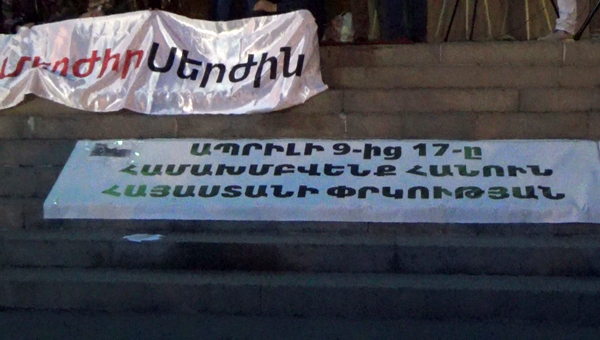The opposition For the State of Armenia movement today held its first rally in the Freedom Square in downtown Yerevan, marking the start of the series of rallies a group of opposition forces – collectively known as the “Reject Serzh” initiative – plan to hold across Armenia over the next week against Serzh Sargsyan’s probable appointment as the country’s next Prime Minister. The first large rally is scheduled to take place on April 13 at the same spot, which For the State of Armenia movement, along with the Civil Contract and Yerkir Tsirani opposition parties, have been given Yerevan Municipality’s permission for.
Those gathered at the Square today heard speeches from a number of members of the initiative, including For the State of Armenia representative Albert Baghdasaryan, who spoke about the group’s possible further plans once they manage to overthrow Sargsyan. The first step, he said, would be to create an interim Government, which would rule for 1-1,5 years and help develop a legitimate Constitution.
Ex-presidential candidate, Heritage party leader Raffi Hovhannisyan, who participated today in the inauguration of President-elect Armen Sargsyan to congratulate him and declare that his appointment was “more or less close to legitimacy,” was also spotted in the crowd at the Freedom Square. Many of those gathered welcomed Hovhannisyan’s presence at the rally, while others criticized his participation in Sargsyan’s oath-taking ceremony.
One group, in particular, could be heard recalling the post-election rallies in 2013, during one of which Hovhannisyan abandoned the crowd of demonstrators on Baghramyan Avenue and joined national police chief Vladimir Gasparyan for a prayer at Tsitsernakaberd, the Armenian Genocide memorial complex.
At some point during today’s rally, prominent human rights defender Arthur Sakunts took to the stage to present some figures and facts, which, he argued, disproved the Republican Party’s claim that “Serzh Sargsyan is irreplaceable.” Sakunts talked about the deadly post-election clashes of March 1, 2008, the growing migration rates, the country’s gravely large foreign debt and its alarming poverty rates, and criticized the nation-army-church concept that has been recently put forward by the authorities.
Watch the human rights defender’s speech in the video below:
 Epress.am News from Armenia
Epress.am News from Armenia
